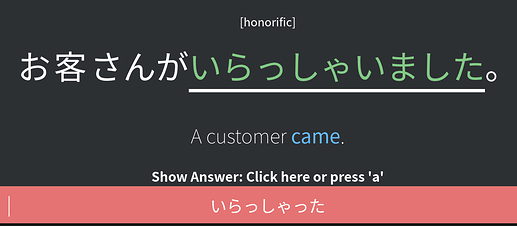to be (honorific)
to come (honorific)
to go (honorific)
Structure
- いる・くる ・いく→ いらっしゃる
- ている → て いらっしゃる
 Remember not to use honorific language when speaking about yourself and your actions!
Remember not to use honorific language when speaking about yourself and your actions!
[いらっしゃる can be combined with で to indicate a state of being (元気でいらっしゃる)]
[おいでになる is another word used to express いく・くる・いる in honorific speech and is synonymous with いらっしゃる]
[お見えになる can be also used in this case, but only meansくる]


 and sorry for the slow answer
and sorry for the slow answer 

